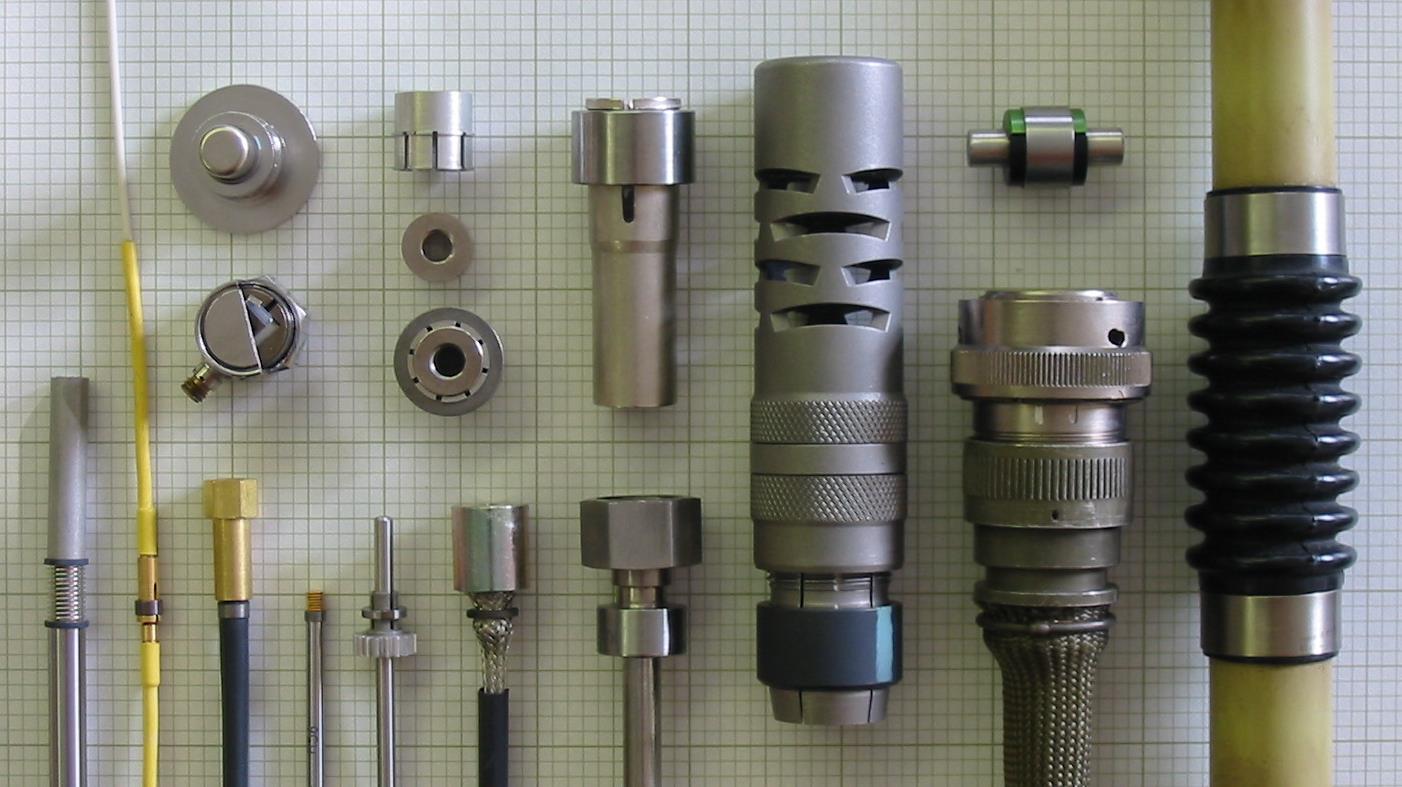Braid Terminations
Terminate metallic EMI shielding braids
as well as Kevlar®, Tyvek®, steel and fiberglass mechanical braids.
Use for small diameter electrical cables, fiber optic cables, overbraided
hoses, and towed array strength members. UniLok is especially
advantageous for applications with severe vibration, thermal cycling or
high temperatures that lead to rapid deterioration of other braid termination
types.
The UniLok ring produces a very high contact pressure between the braid
and connector such that a "gas tight seal" is created. This
means that oxygen is excluded from the contact area so the contact surfaces
will not oxidize over time, whch would otherwise lead to increasing electrical
contact resistance.
top
site navigation
|
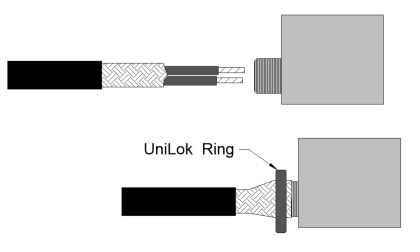 |
Electrical
Connectors
Zero insertion force combined with extreme
retention strength and vibration resistance. The exceptionally high
contact closure force applied by the shape memory ring produces a gas-tight
seal between contact surfaces, resulting in a stable, low-resistance connection.
Use for munitions, missiles, high amperage buss connections and bulkhead
feedthroughs. The connector is de-mated by cooling with either liquid
nitrogen or HFC spray refrigerant, depending on the alloy chosen.
top
site navigation |
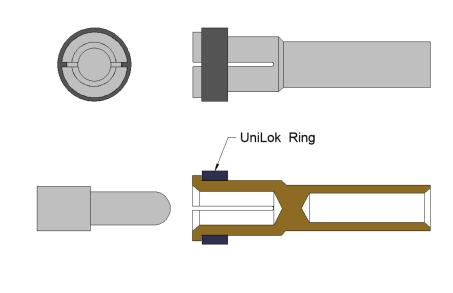 |
Lens and Window Mounts
UniLok fastener rings apply even pressure
to mount delicate lenses in holders. When a sealed mount is required,
the ring compresses a non-slotted tubular fitting onto the lens or window.
A soft metal plating may be applied to the fitting to enhance sealing.
Use for sapphire, germanium, ferrite and calcium fluoride lenses and windows.
top
site navigation |
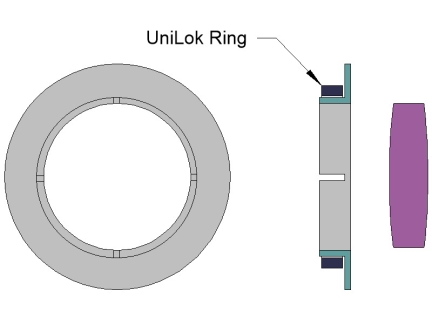 |
Magnet Assemblies
Bind magnet assemblies where extreme
temperatures, rpm or shock loading render other assembly techniques inadequate.
UniLok shape memory rings offer over
10 times the motion of conventional thermal shrink fits. This allows looser
tolerances on mating parts and results in the large interference strains
needed to achieve consistent clamping pressure. Installation time for
shrink fits can be quite limited, while heat-to-recover UniLok rings allow
unlimited time for positioning components prior to shrinkage.
top
site navigation |
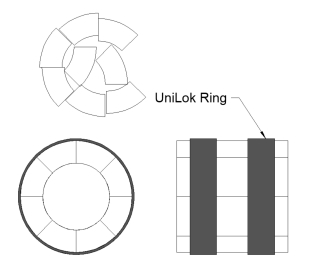 |
Accelerometer
Assembly
Clamp mass elements and piezoelectric
material against the center post of shear type accelerometers. UniLok
shrink rings provide easy assembly, consistent performance, and insensitivity
to temperature extremes.
top
site navigation |
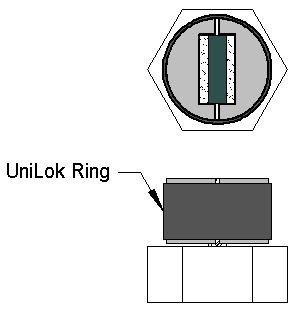 |
Shaft Clamps
Reliable clamping in a lightweight,
compact, balanced package. No threaded fasteners to vibrate loose. Much
smaller size than mechanical shaft collars of equivalent holding strength.
Precise axial and angular positioning can be achieved since heat is used
to set the clamp, rather than applying an external torque which can cause
unwanted movement. Use for rotary power transmission, instrument assembly
and torsion bars. We make UniLok shrink collars for small diameter shafts
where other collar styles are unavailable.
top
site navigation |
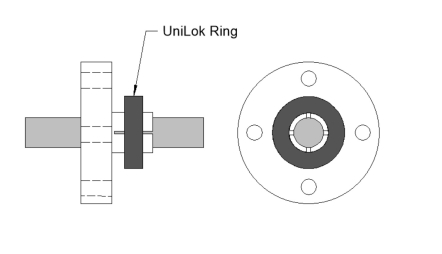 |
Axial Preload
Allows a precise preload force to be
applied and then locked in. Avoids the fines generation which occurs
when press fitting. Use for bearings, disk mounting, and other axially
preloaded assemblies.
top
site navigation |
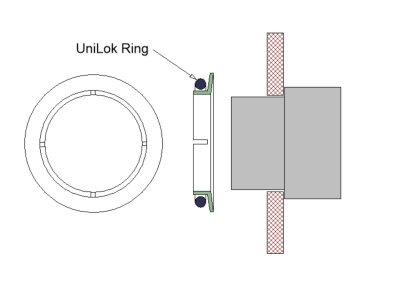 |
Preload of Threaded Fasteners
UniLok memory metal rings installed
as washers expand in length as they shrink in diameter, applying controlled
preload.
top
site navigation |
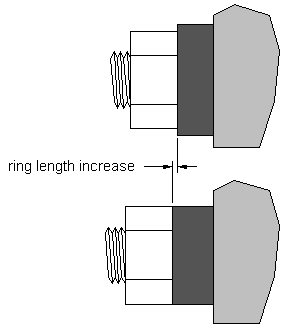 |
Locking Nuts
Heat shrink rings provide positive
locking of critical threaded joints. No interference with torque/tension
relationship during tightening.
top
site navigation |
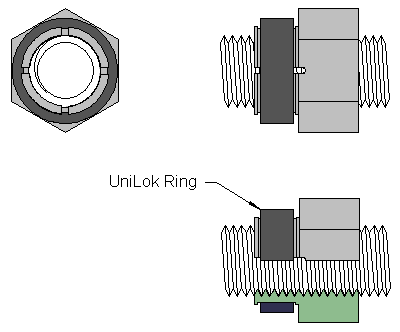 |
Hermetic Seal
Shape memory alloy seal rings swage
thin-walled metal cups and tubes onto headers to seal hermetic assemblies.
The ring drives the can onto the teeth and holds it there for the life
of the joint. Use in the packaging of gyroscopes, sensors, fuses, and
other electro/optical/mechanical packages.
top
site navigation |
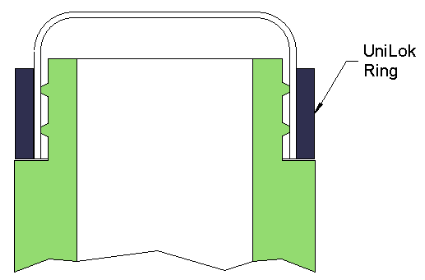 |
Tube
Joints
UniLok heat shrinkable rings offer seamless
clamping pressure that can be controlled to terminate anything from thin
elastomeric tubing to heavy wall steel pipe.
In the joint pictured, two SMA rings
swage the tubes onto a fitting with circumferential sealing lands, teeth,
on its outside surface. This geometry is used for deformable composite
tubing and thin wall metallic tubing such as aluminum conduit and ducting.
Generally, the fitting is a harder material
than the tube. The teeth bite into the tube, locally flowing the
tube material to create the seal and providing a mechanical interlock
for burst, tensile and bending strength.
top
site navigation |
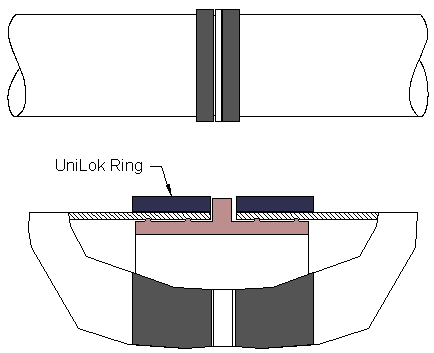 |
Swaged Fitting Tube
Joint
The
UniLok ring compresses a fitting onto the outside of a tube. Teeth
on the inside of the fitting barrel are driven into the surface of the
tube. This design is applicable to most metallic pipe and tube except
for very thin wall (small t/d). It is also used for attaching metal
fittings to rigid composite tube and polymeric fittings to thin wall metal
tube.
Typically the fitting material is chosen
to be of similar hardness to the tube. However, polymeric fittings
are generally of lower hardness than the tubing. In this case sealing
is achieved by flattening of the teeth against the tube.
top
site navigation |
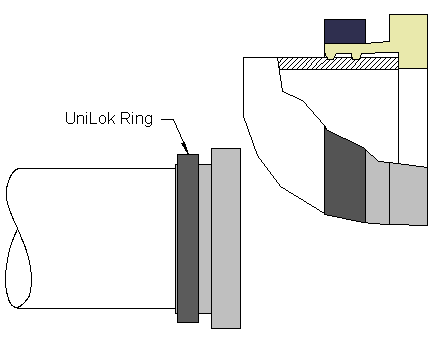 |
Hose
Termination
The UniLok ring compresses elastomeric
or plastic tubing onto a fitting
with closely spaced sealing lands. Potential applications include
sonar towed arrays, geophysical streamers, high temperature Viton®
sleeving, Teflon® tubing, and wiring harness boots for high temperature
applications. Generally UniLok rings are advantageous for high strength
or thin walled tubing where crimp rings and hose clamps fail due to insufficient
retained clamping force or non-uniform clamping pressure. Thin UniLok
bands can be used where the closure mechanism on other bands creates problems
with snagging, space constraints or, in towed arrays, noise generation.
top
site navigation
|
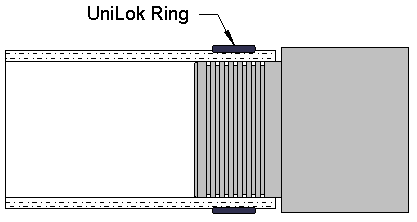 |
Rod and Cylinder Mechanical Joints
Many designs are possible depending
on the requirements and materials involved. One cylinder may overlap
the other with a UniLok ring compressing the outer cylinder onto the inner
cylinder. In other cases, each end of a coupling sleeve is compressed
onto a cylinder end by a ring. The joint may hold by simple friction of
smooth surfaces pressed together, or teeth can be machined on one surface
to dig into the other. The outer cylinder or sleeve is normally
slotted to reduce the ring clamping force required. Slots offer
the additional benefit in toothed designs by introducing circumferential
interruptions in the teeth that increase torque strength. Use for
telescoping structures, metal to ceramic joints, etc.
Large tubular structures can be joined with simple marmon clamps locked
in place by shape memory alloy rings.
top
site navigation
|
High strength coupling with zero
axial and angular play.
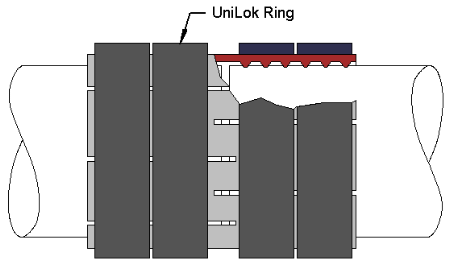
Interlocking crenellated cylinders,
high torque strength
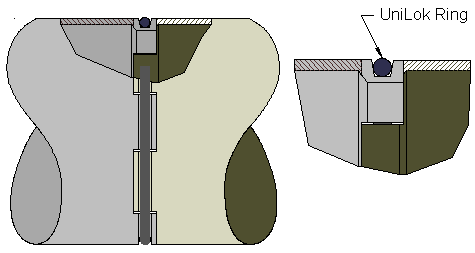
|
Tamperproof Fastening
UniLok fastener rings are ideal for
security and general tamper proofing applications, offering no conventional
means of dis-assembly. Removal requires cutting with powered abrasive
tools or cooling with liquid nitrogen. Rings made with our nitinol
Alloy D can be removed with "freeze spray" or CO2. Use for field
assembly of security hardware, tamperproof closures for instruments, etc..
top
site navigation
|
|
Blind
Assembly
Since UniLok rings are actuated by temperature,
they can be installed in remote or inaccessible locations. Heating can
be accomplished by placing the assembly in an oven, ducting hot air or
oil to the ring, induction heating or by conduction from an electric heater
element.
top
site navigation |
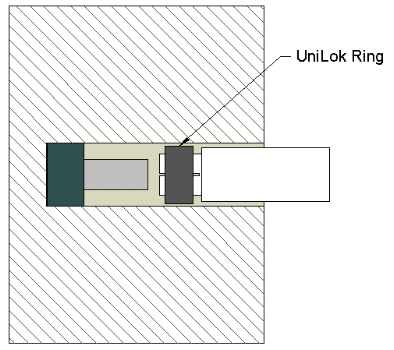 |


